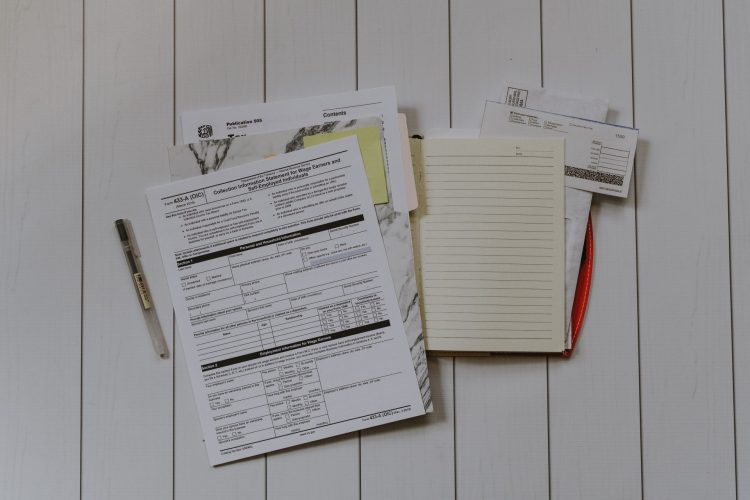If you have never had to deal with it yourself, the words taxes, income-related expenses, and tax office sound somehow unpleasant, labor-intensive and terribly dry. This is the reason why many students put off or even ignore the topic of employee assessment and student tax return. However, choosing to deal with taxes, your obligations, and the associated benefits while you are still studying would make sense to be on top of your responsibilities. We have summarized the most important questions and answers to make it easier to get started with taxes and your studies.
With the help of a tax return, you provide the tax office with a lot of information to calculate your annual tax burden. At the end of the tax return, you will either see a plus if you have paid too much tax or a minus if you owe the state more tax. A tax return is always filed per calendar year.
Both terms are tax returns. For salaried employees, they are called employee assessment or income tax return. Self-employed persons, on the other hand, file an income tax return.
Students are not liable to pay taxes due to their status, since they normally do not earn money during their studies. However, if you start with a paid internship, a student job or generate income from self-employment, you need to find out about the applicable taxes. As soon as your total annual income exceeds the current tax threshold, you are liable to pay taxes – regardless of whether you are studying or not.
Wage tax is levied on the salary or wages of employees. This, together with social security contributions, is paid directly by the company. Self-employed persons, on the other hand, must pay income tax and take care of settling their tax liability themselves. In both cases, the calculation is based on the so-called tax classes.
In general, students are not required to file a tax return just because they are enrolled in their studies. Whether you have to file a tax return in your case depends on how much you earn per year and from which sources this money comes from.

You should deal with the unpleasant things head on – this may include your tax return. However, a tax return should be filed in the following year. During the year, however, you should start collecting all receipts and carefully filing or storing them. This will make the procedure easier for you in the following year and you will have everything at hand when it comes to an audit by the tax office. You must keep the receipts for seven years.
The easiest way to file an income tax return is to get started with FinanzOnline. To do this, you need a cell phone signature, for example. Alternatively, you can submit the tax return in paper form or make use of a tax consultation.

Students often change their jobs. However, the amount of tax that is automatically paid by the company each month is calculated based on the entire calendar year and based on tax brackets. As a result, students often pay too much, which they get back as a wage tax credit through the employee tax assessment. In addition, you can claim all your university expenses against tax, which should make the repayment even higher. Furthermore, it is possible that you will get a refund of overpaid social security contributions – keyword negative tax. You definitely should not renounce this type of money.
Go to FinanzOnline, where you will already find a lot of information from your payment slips and reports on donations and church contributions. Then add all expenses that are tax deductible. Alternatively, you can submit it in paper form using the L1 application form, or you can have it done by a tax advisor.
Retroactive employee assessment is possible for a maximum of five years. So, if you have not taken care of your student tax return for a few years, it should not be a problem to catch up.
In Austria, as of July 2017, the tax office automatically refunds overpaid income tax amounts. Social security contributions and deductions for single parents or single earners are also included. However, the calculation by the tax office only takes place under certain conditions. You must have been exclusively liable for income tax – self-employment is a knock-out criterion. In addition, you must not have already submitted the assessment yourself or actively waived it. Furthermore, the tax office must assume a credit and that no income-related expenses, special expenses, and other deductions are to be taken into account.
Although the online employee assessment is relatively quick and straightforward to complete, the application-free employee assessment can be a great relief. Because if the conditions apply to you, you do not have to do anything at all to get your money. You will receive the repayment amount in the 2nd half of the following year. You will be notified in advance by the tax office in writing and, if necessary, asked to disclose your account.
Now it gets interesting – especially if you pay income tax. All expenses related to your studies can reduce your tax burden and lead to a refund. The so-called advertising costs include, for example:
By the way: If you are self-employed, the costs for your studies count as business expenses and not as income-related expenses.
Tuition fees are tax deductible. As income-related expenses, they are to be entered in the employee tax assessment under education, training or retraining costs. For self-employed persons, tuition fees fall under business expenses.
Business expenses are private expenses or expenditures that serve to secure a job (employment) or are to be paid involuntarily. Improving your professional opportunities, securing career prospects and being in the best possible position for the job market ultimately costs money. That is why expenses that are directly related to your studies can be claimed as income-related expenses for tax purposes.
If you have a low annual income, i.e. less than 21,500 euros, you are entitled to a credit for overpaid social security contributions. This is called negative tax or Social security contributions (SV) bonus. However, you must be employed and have paid social security contributions in order to receive a 50 percent refund. If this applies to you, you can look forward to a refund of a maximum of 800 or 900 euros if you are entitled to a commuter allowance. You can also receive a credit for social security contributions if you are self-employed in addition to your job.
Do you need support? Then take a look at the completion help for the employee tax assessment. The Chamber of Labor also offers a lot of tax tips for students. You can obtain personal advice from the Austrian Student Union (ÖH Wien Steuerberatung).
Taxes during your studies – now you know what is important. You can find more tips on financing your studies in our article.